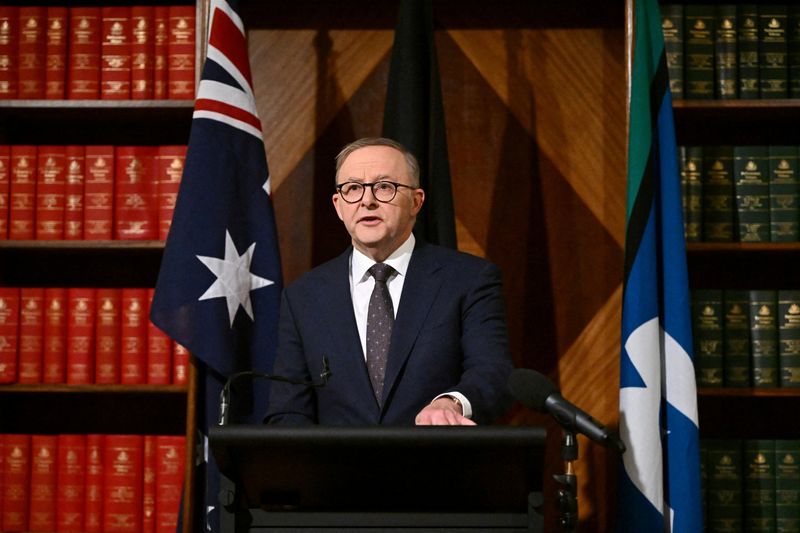By Kirsty Needham
SYDNEY (Reuters) – Prime Minister Anthony Albanese will highlight trade as an anchor for stabilising ties when he makes the first visit by an Australian leader to China in seven years, as badly strained relations move back to an even footing, business leaders said.
Albanese, who arrives on Saturday, will attend the opening of China’s top imports fair in Shanghai, and speak to a large business delegation, the following day.
He has said he also will raise concerns over rising tension in the South China Sea in a meeting with President Xi Jinping in Beijing on Monday.
His government has taken credit for stabilising ties with Australia’s largest trading partner since coming to office last year, as China lifted most trade blocks imposed in a 2020 diplomatic dispute that cost A$20 billion in commodity and food exports.
Even as Australia moves closer to security ally the United States, which has agreed to sell Canberra nuclear-powered submarines under a trilateral defence technology partnership, AUKUS, with Britain, and boosted military exercises, Albanese has emphasised the importance of better dialogue with Beijing.
“China is the source of our greatest security anxiety … China is also our largest partner and we do value a productive relationship,” Defence Minister Richard Marles told reporters in Washington this week.
A quarter of Australia’s export earnings come from China, more than the next three trade partners, the United States, South Korea and Japan combined, Albanese said on Tuesday.
“Trade as an anchor provides stability and certainty to allow greater engagement while we navigate uncertain currents and obstacles that lie beneath,” said Australia China Business Council president David Olsson.
More than 250 Australian companies will exhibit at China’s International Import Expo (CIIE) in Shanghai, to be opened by Premier Li Qiang on Sunday, showcasing products that were top sellers in China before trade hurdles were imposed – seafood, beef and wine – as well as the iron ore exporters that dominate Australia’s trade to China, Fortescue Metals, Rio Tinto and BHP .
“The prime minister’s attendance at CIIE and the signal it sends to the Chinese system and business community, is likely to result in more positive attitudes toward Australia as a trade partner,” Olsson said.
Chairman of the Business Council of Australia’s global engagement committee, Warwick Smith, said Albanese would highlight the complementary nature of bilateral trade in a speech on Sunday to 500 business people.
“It is important that dialogue has resumed,” he said.
DIFFICULT TOPICS
China has lauded the visit’s timing, on the 50th anniversary of the first to China by an Australian leader, then Prime Minister Gough Whitlam.
But despite the positive tone, Australian Foreign Minister Penny Wong has said ties won’t return to where they were even 15 years ago, when Chinese investment surged into the economy.
Australia has blocked two Chinese investments in rare earth miners this year on national interest grounds, and in Washington last week, Albanese sought to boost U.S. investment in Australia’s minerals sector, to reduce reliance on China.
China’s ambassador, Xiao Qian, in an Australian newspaper column on Friday, said ties were at a “critical juncture of setting off and sailing off again”, and urged more cooperation in “such traditional areas as energy, mining, agriculture, education and tourism”.
Asia Society Australia executive director Richard Maude, a former diplomat who wrote Australia’s 2017 foreign policy white paper, said the list of difficult topics for the Australian and Chinese leaders was long.
“The South China Sea and especially China’s attempts to force the Philippines off Second Thomas Shoal will have to be high on the agenda, but the prime minister will also need to make it clear that any attempt to force unification with Taiwan will carry severe consequences,” said Maude.
Although the Albanese government has put dialogue at the centre of its approach to China, most policy remains the same, he said.
“On the defence front, the Albanese government has doubled down on supporting America build the fabric of military deterrence across the Indo-Pacific. That duality of approach is quite evident to China,” he said.
(Reporting by Kirsty Needham; editing by Robert Birsel)
